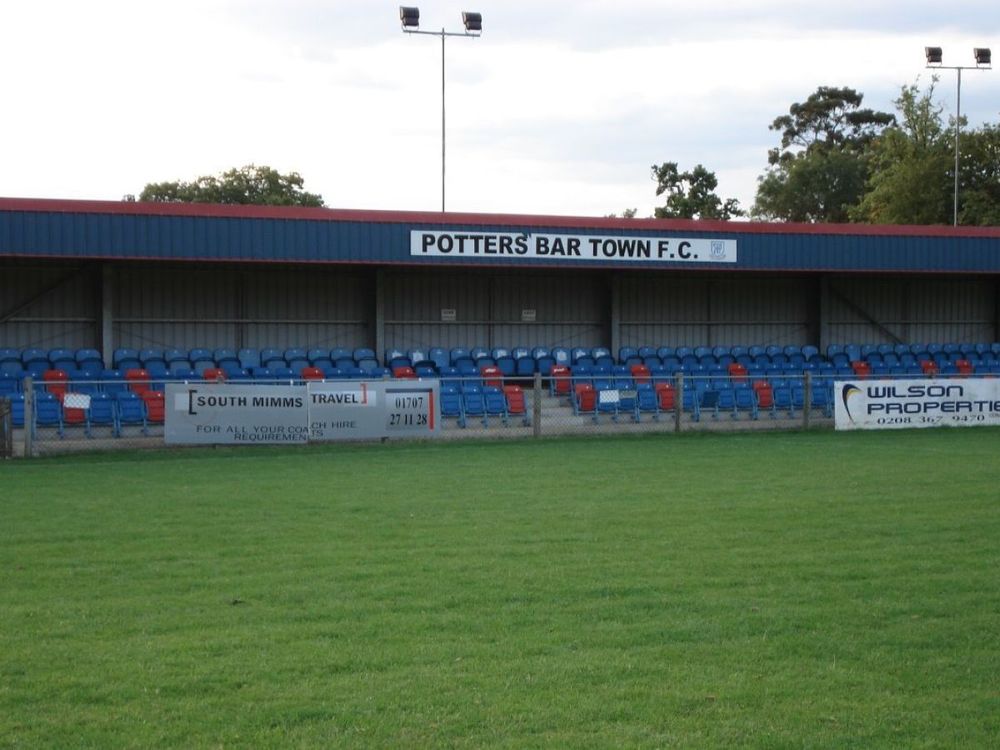
The foundations for Potters Bar Town were laid in 1960 as Mount Grace Old Scholars.
The school's first team were having a good season, but many of the boys were due to leave at Easter and it was then that Ken Barrett - the PE master of Mount Grace School - asked them and old 'Scholars' to support him in raising a team.
The club were accepted into the Barnet & District League in June 1960 and Barrett third and fourth teams were added in the following seasons.
In 1965, the Barnet & District and Finchley & District Leagues merged to form the North London Combination.
By 1967/68 the club had won the Premier Division and the reserves the Division One title and were admitted to Division Two of the Herts County League.
In 1976, Bill Venneear and Clive Cavalier stepped down and Peter Waller, then the third team manager, was ‘persuaded’ to take over.
In 1978 many recommended the closure of the club, but it continued, although the three sides were relegated.
Micky Holson became first-team manager and in 1981/82 the side were in the Premier Division, as Division One champions.
Clive Cavalier re-joined in 1979 and with Peter Waller planned the new clubhouse and changing rooms. Construction started in July 1982 and in six months, with Frank Bentley's considerable involvement and help from members, the clubhouse opened in January 1983.
In 1990/91, the club reached the FA Vase Third Round after good wins against Winslow United, Clapton, Wootton Blue Cross, Elliott Star before losing 2-1 at Southern League Midland Division side Buckingham Town.
That momentum helped as they came back from a 24-point deficit to win the Herts Senior County League Premier Division and the Aubrey Cup.
The club accepted promotion to the South Midlands League and changed its playing name to Potters Bar Town FC to reflect the growing stature of the club and promote the Town.
The club installed floodlights in 1993, the youth section was re-formed in 1993/94 and FA Cup football came in 1995/96, albeit briefly with a 1-0 Preliminary Round exit at Flackwell Heath.
In 1996/97, the South Midlands Premier Division title was won, but Town knew there was too much work to do to apply for the move up to Step 4.
The following season, 1997/98, the club reached the quarter-final of the FA Vase after wins against Potton United, Fakenham Town, Whitstable Town, Bridport, former winners Stamford and Great Wakering Rovers.
Potters Bar bowed out 2-0 to Kidsgrove Athletic, only conceding in the second period of extra-time.
The club were runners-up in the league but won the Challenge Trophy and the South Midlands Floodlight Cup.
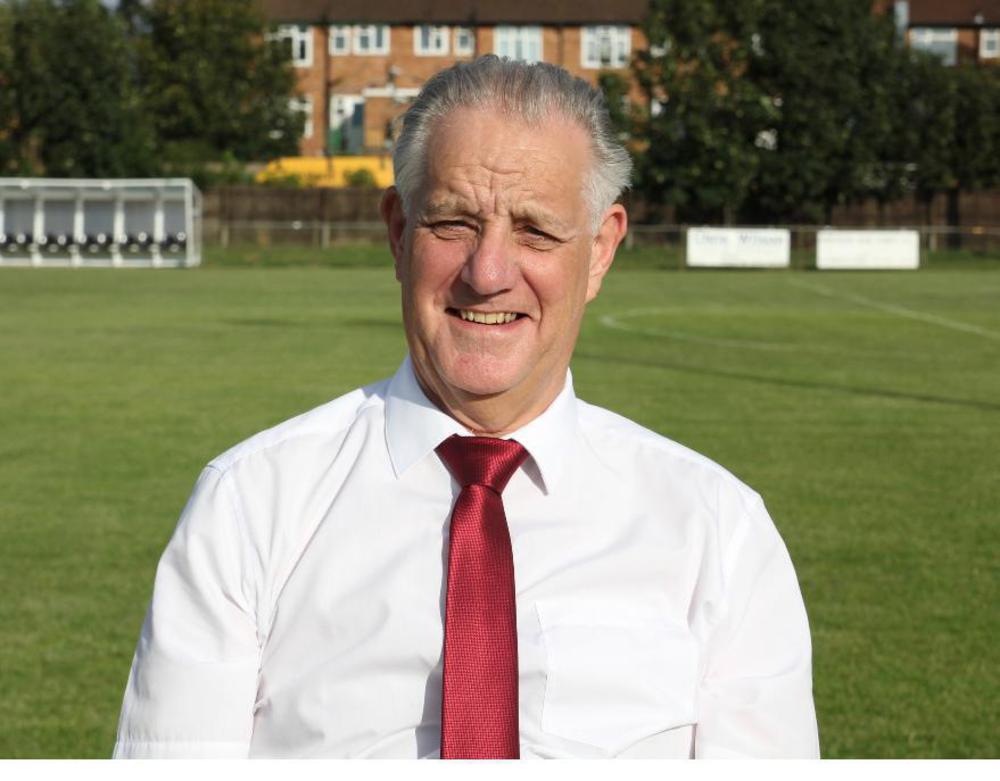
Peter Waller
In 1998, Peter Waller and Eddie Harvey secured a new 21-year lease on the ground, whilst on the site the old school was demolished, replaced by a new Ladbrooke School, Care Home, new car park, and the 150-seater main stand was added in May 2001.
For Season 2001/02, Steve Smart became manager and by 2002/03, with Paul Surridge, Town achieved third place in the league and won the Herts Charity Shield.
The Potters Bar Charity Cup followed in 2003/04, but 2004/05 was the most successful of Smart`s three-year reign, winning four trophies - the Spartan South Midlands League Premier Division and the Premier Division Cup, Herts Charity Shield and Potters Bar Charity Cup.
The club went on to take the title by 16 points, remaining unbeaten in the final 19 league matches, including 16 victories.
Off the pitch, in six weeks, club members and players carried out major improvements and Potters Bar passed the FA Ground grading and earned promotion to the Southern League Division One East for season 2005/06.
The club were expecting to become members of the Isthmian League, but the FA`s major restructuring of the non-League Pyramid at the time, saw several Essex/Herts sides moved into the Southern League.
Steve Smart stepped down as manager and Kevin Lucas was appointed, and then replaced after a short spell by Andy Milne.
Although Town were bottom for six months, Andy Leese agreed to join in February 2006 and brought in several new players.
Fortunes changed and Town survived relegation, finishing 16th.
For 2006/07, the club were moved to the Isthmian League Division One North and the club won the Herts FA Charity Cup for the first time, but lost Andy Leese in May 2007 and Steve Browne was appointed, although he resigned in December 2008.
Adam Lee was appointed in 2008 and for five years served the club with great distinction and commitment, always improving the league position and reached the Herts Senior Cup final in 2012/13 for the only time.
In May 2010, to celebrate the club`s 50th year, many former players returned, including nine who had played in the very first match in September 1960!
For 2013/14, Town were back in the Southern League Division One Central and in late 2013, Lee stepped down, succeeded by Jack Friend, then in early 2015, by Steve Ringrose.
In 2015/16, Town reached the semi-final of the Southern League Cup, and then in 2016/17 made the Fourth Qualifying round of the FA Cup for the second time, including a replay win at Bath City on penalties (the club`s best result against a team from a higher level).
For 2017/18, Potters Bar were back in the Isthmian League Division One North and targeted the play-offs, being eighth in January. However, in the remaining 22 fixtures, Town won 15 and drew 5 and came through to take second spot and promotion, with a win on the final day.
Season 2018/19 was to present two challenges – firstly to make the necessary ground improvements to reach the next level ground grading requirements - Grade ‘C’ - which meant the addition of two new stands - one a 100-seater and the other a 100 standing - this was achieved on time - thanks to the hard work of club members and supporters and fundraising and grants.
The second was to establish themselves at Step 3 of the non-League Pyramid - this they did - finishing 16th in the Isthmian Premier, despite James Duncan and his management team leaving in October – but again Town promoted from within with Lee O'Leary stepping up to player-manager and being joined by Scott Cousins as joint manager.
Unfortunately, the pandemic has halted any further progress.
Road-Sea Southampton were only founded in 1973 and originally played in the City of Southampton Sunday League, where they won every possible honour as they rose up through the divisions and in 1976/77, they reached the semi-final of the FA Sunday Cup.
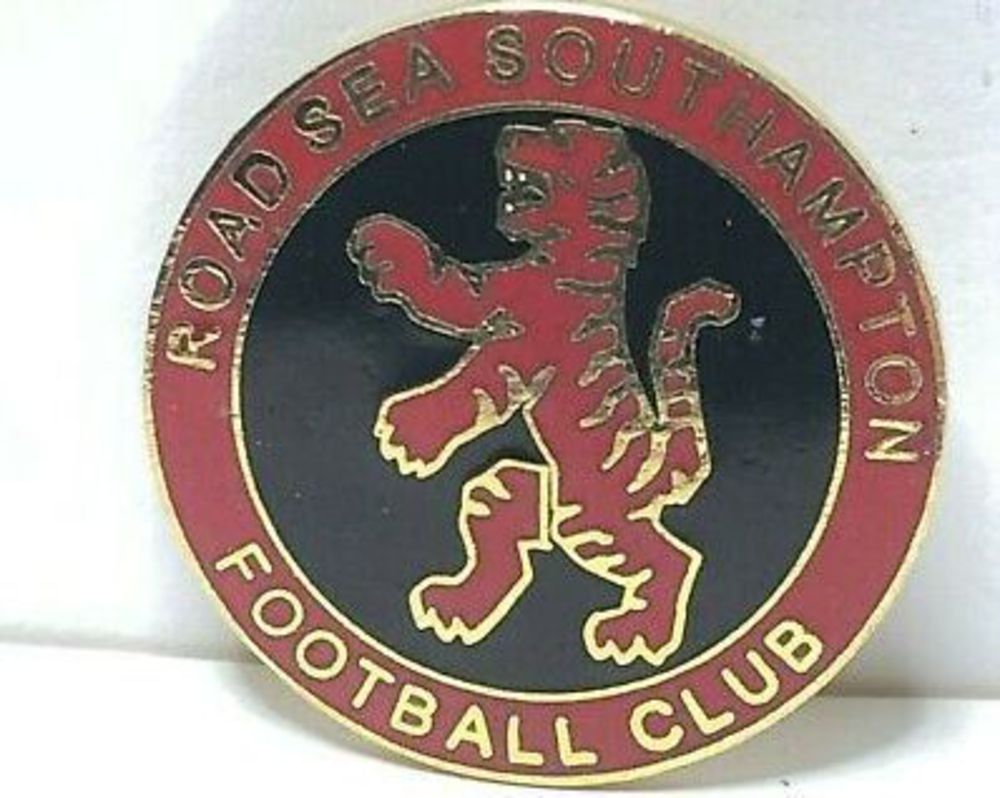
Road-Sea then purchased some land near Southampton and with the aid of some fine financial backing, and momentum from team manager Peter Price saw the facilities develop.
This resulted in an ambitious application to join the Southern League being sensationally accepted in 1982, despite no history whatsoever of playing Saturday football.
Whilst in the Southern League Southern Division, Road-Sea silenced their critics as they pushed for promotion to the Premier Division and after finishing a highly creditable third in their debut season behind champions Fisher Athletic and Folkestone, they won promotion as champions in 1983/84.
Road-Sea continued to thrive in the highly competitive Premier Division as they then finished a marvellous fifth in 1984/85 before, after finishing 16th in 85/86, they surprisingly decided to withdraw from the league.
Road-Sea finished runners-up in the first season of the Wessex League, reached the final of the Hampshire Senior Cup and won both the League and Russell Cotes Cup's but the club's short but amazing history was ended when they lost their financial backing, which resulted in their sudden demise in 1987.
Raunds Town were formed way back in 1896 as Raunds Unity and have had three spells in the United Counties League, interrupted by periods in local leagues such as the Northants League.
In May 1946, a meeting was called and Raunds were re-formed, separate from any previous club with Raunds in its name.
By then, the UCL had expanded to two divisions and the new format allowed Raunds Town to join and the club remain members to this day.
However, things were distinctly grim for the Shopmates - so called due to the number of shoe workers in the town – until 1969/70 when they finished third in Division Two.
But another slump in fortunes saw Raunds relegated to Division Three in 1979 (despite possessing a certain media manager at full-back!).
Yet again, the league underwent a change in format in 1980 and the club took a turn for the better.
The appointment of Maurice Murphy as manager was the real turning point and the following season, Raunds finished third in Division One and then won the title in 1982/83.
Murphy was succeeded by former Bedford Town stalwart Alan Wright and improvements continued.
In 1988/89, the club finished sixth in the league and reached the final of the Daventry Charity Cup where they lost to Banbury United.
At the end of that campaign, Wright decided to step down and manager and reserve team boss Keith Burt was asked to take over.
He brought in Glen Burdett, previously manager of league rivals Long Buckby, as his assistant and the pair went on to be responsible for the best years in the club`s history to date.
They were never out of the top six in the division and finished as runners-up in both 1991/92 and 1994/95 – the season the Shopmates almost made it to Wembley but for an amazing semi-final against Arlesey Town.
Having reached the Fourth Round the previous season, Raunds were given a bye to the First Round where they hammered fellow UCL side S&L Corby 5-0.
Wins over Great Wakering Rovers, Lowestoft Town, West Midlands Police, St Andrews and Basildon United earned them a place in the last four.
And after a comfortable 3-0 win at their Kiln Park home in the first leg, Raunds supporters were already looking up travel plans for Wembley.
Unfortunately, so perhaps were Keith Burt`s players as Arlesey amazingly overturned that deficit in extra-time to win 5-3 on aggregate and went on to win the Vase by beating Oxford City in the final.
It would have been understandable if, following that heart-breaking defeat, Raunds had gone into decline, but just the reverse happened in fact.
That Vase defeat wasn`t the only blow to the club at the end of the 1994/95 season as, having been informed by the UCL that their ground was suitable for promotion to the Southern League and, knowing that champions Boston Town`s Tattershall Road stadium wasn`t, runners-up Raunds eagerly looked forward to the inspection which was expected to be a formality.
Imagine their disgust and annoyance when Southern League officials told them that Kiln Park actually needed quite a bit of work doing before it was suitable for Step 4!
The 1994/95 had been the best to date in their then-99-year history – but better was to follow as momentum created by their run in the Vase and their backlog of fixtures which saw them finish second – frustratingly the Vase defeat at Arlesey being their only loss away from home all season, helped them to win the UCL Premier Division title in 1995/96.
But it was far from comfortable.
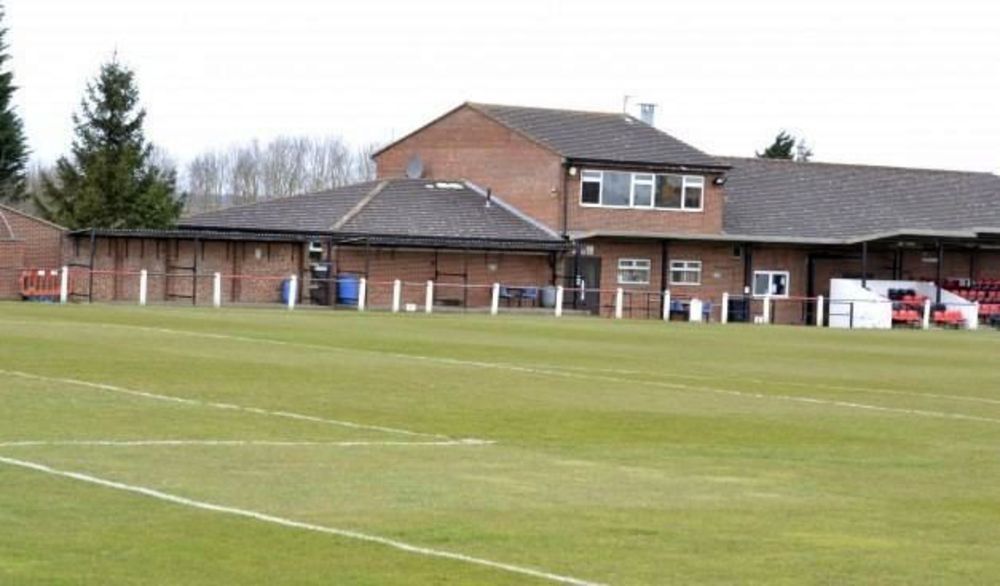
Raunds Town Kiln Park
Three clubs pulled away from the pack in the UCL, with Desborough Town, enjoying their best season for many years, left to rue a series of early season defeats in the final analysis as they ended up in third spot.
It was Raunds and Stotfold who matched each other stride for stride in the closing weeks and when they met at Kiln Park on the final Wednesday of the season, Stotfold, unbeaten in 20 outings, held a three-point lead over their hosts, who boasted a 21-game sequence without a loss.
Raunds, who had suffered heartbreak aplenty on numerous fronts during the last two years or so, rose to the occasion and raced to a 5-2 victory.
That win left them ahead on goal difference and the contenders had one game left.
Stotfold`s final match was at Holbeach United, who had beaten them at Roker Park on the season`s opening day.
The Carters Park clash kicked off early as the Tigers had a reserve game to fit in on the same afternoon - but the Eagles kept up their challenge with a 2-1 success.
Back at Kiln Park, Raunds were holding an interval lead against Long Buckby but within 5 minutes of the restart, the Bucks were on level terms.
As the match moved into stoppage time, the title looked to be heading south, but 4 minutes into time added on, top scorer Shaun Keeble`s close-range header gave the Shopmates a 2-1 win, their first UCL Premier Division title and promotion to the Southern League.
Raunds were a touch unfortunate in their short, four-season spell in the Southern League as in that time they were switched sections three times.
Burt had a couple of seasons in charge in the Southern League Midland Division, helping the club finish tenth and a very creditable fourth, ahead of the likes of Stafford Rangers, Redditch United, Stourbridge and county rivals Brackley Town and Corby Town, who ended up bottom of the table.
Burt went on to spend a successful couple of years in charge of the Northants County Youth side, leading then to their first National County Cup success, and has built up a reputation as a successful scout in more recent times.
Rather bizarrely, Raunds and county rivals Corby and Brackley were switched to the South Division in 1998/99 which meant long journeys to the likes of Margate, Newport Isle of Wight, St Leonards and Dartford, but Raunds did well under new boss Adam Sandy to finish sixth.
They were switched once again ahead of the following campaign to the Division One East and finished second-from-bottom and were relegated back to the United Counties League with, ironically, neighbours Corby sending them down on the final day on goal difference!
Raunds suffered relegation from the UCL Premier Division in 2010/11 and haven`t been able to get out of Division One since, although they did manage to finish fourth in 2017/18.
Football in the village of Rocester can be dated back as far as 1876 but they were playing in the local Uttoxeter League and Stafford Amateur League for much of their first 70-odd years of existence.
Then in 1957, after so much success in the Stafford Amateur League, the club looked for a new challenge, and gained entry into the Staffordshire County League (North) in time for the 1957/58 season, which marked the beginning of a 27-year association with that league.
The first four years of the 1980s were spent in mid-table territory with a team that was competitive but not strong enough to challenge for honours.
The club was dealt a severe blow with the untimely death in 1984 of club stalwart Ken Green, who died at just 54 years old after serving the club for 24 years - many of them as chairman.
His sudden death seriously threatened the club's future as there were so few people working behind the scenes, and even dedicated clubman Gilbert Egerton, who had kept the club running alongside Green for many years, was doubtful that the club could continue.
However, all that was to change when one of the senior players - Alan Beaman - turned up at Egerton's front door with an offer to take over as manager.
His offer was accepted, and he took over the reins from Alan Smith, another former player who had been in charge for a number of years.
It was a turning point in the club's history, and the beginning of an incredible journey that saw Rocester rise up from being County League minnows into a respected semi-professional set-up with a team capable of taking on the non-League elite.
The Staffordshire FA Vase was won in 1986 and in the following season, Rocester reached the last 16 of the FA Vase, knocking out the holders, Halesowen Town, on the way.
Rocester looked for a new challenge, moving into the Hillsfield ground in 1987 and joining Division One of the West Midlands (Regional) League.
The club won the title at the first attempt, being unbeaten for 22 games and winning the League Cup and retaining the Staffordshire FA Vase as well.
Promotion followed to the Premier Division where they finished runners-up on goal difference to Hinckley Town in 1989/90.
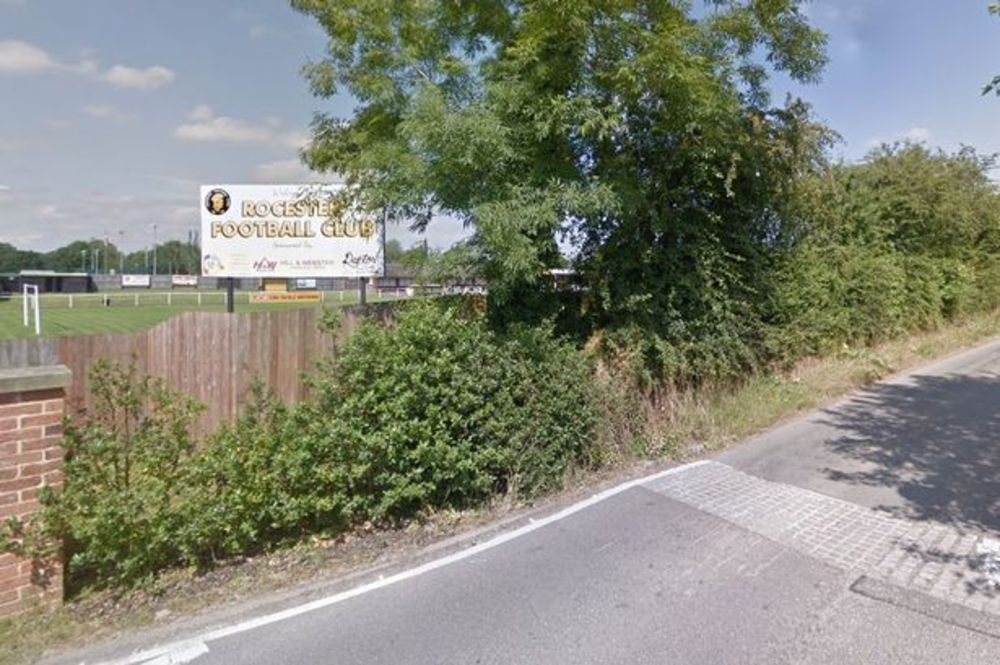
Rocester became founder members of the Midland Alliance at the start of 1994/95 and after finishing runners-up to Bloxwich Town in 1997/98, won promotion to the Southern League as champions the following season.
Placed in Division One West, Rocester finished 16th in their first season at the higher level and improved that to tenth in 2000/01, also reaching the final of the Staffordshire Senior Cup for the first time.
However, after two consecutive last-place finishes – the first time only reprieved from relegation due to Bloxwich United folding - the Romans were relegated back to the Midland Alliance in 2002.
Rocester soon recovered, though, and were champions at the first attempt in 2003/04 but due to another re-organisation of the non-League Pyramid, the Romans were placed in the Northern Premier League Division One, where they endured a disastrous season, picking up only 6 points from 42 games and no wins to finish rock-bottom – 36 points adrift of second-from-bottom Rossendale United.
The following season back in the Midland Alliance saw the team continue their terrible run - their first win not coming until January - finally ending a run of 67 league matches without a win.
After finishing bottom of the Alliance, the club only avoided a second successive relegation due to league re-structuring.
However, within two years Rocester were back among the leading clubs in the Midland Alliance, finishing twelfth in 2007 and fifth in 2008.
The Romans recorded a 3–0 win over Kidsgrove Athletic at Vale Park in April 2008 to win the Staffordshire Senior Cup for the first time.
In 2014, the Midland Alliance and Midland Combination merged to form the new Midland League and Rocester were placed in the Premier Division.
But in 2017/18, another poor season saw the Romans finish well adrift at the bottom of what was admittedly a strong division and they were relegated to Division One where they remain.
Romulus were formed in 1979 by the current club President Roger Evans and Ken Powell.
Initially the team played Sunday league and youth football but after a number of successful years, they stepped up to senior football in 1999, entering the Midland Combination.
As well as winning trophies, the Roms also developed a reputation for producing top class youth team players.
Dean Sturridge (Derby, Leicester), Stuart Bowen (West Bromwich Albion), Luke Rogers (Shrewsbury Town & LA Galaxy) Darius Vassell (Aston Villa, Manchester City and England), Pablo Mills (Derby, Rotherham and Crawley), brothers Stefan and Luke Moore (Aston Villa), and Zat Knight (Fulham, Aston Villa and Bolton), Marvin Johnson (Kidderminster and Motherwell), Nathan Blissett (Kidderminster Harriers and Bristol Rovers), and Ben Richards-Everton (Partick Thistle via Tamworth) are all players who went on to flourish in professional football after lengthy youth service to the Romulus.
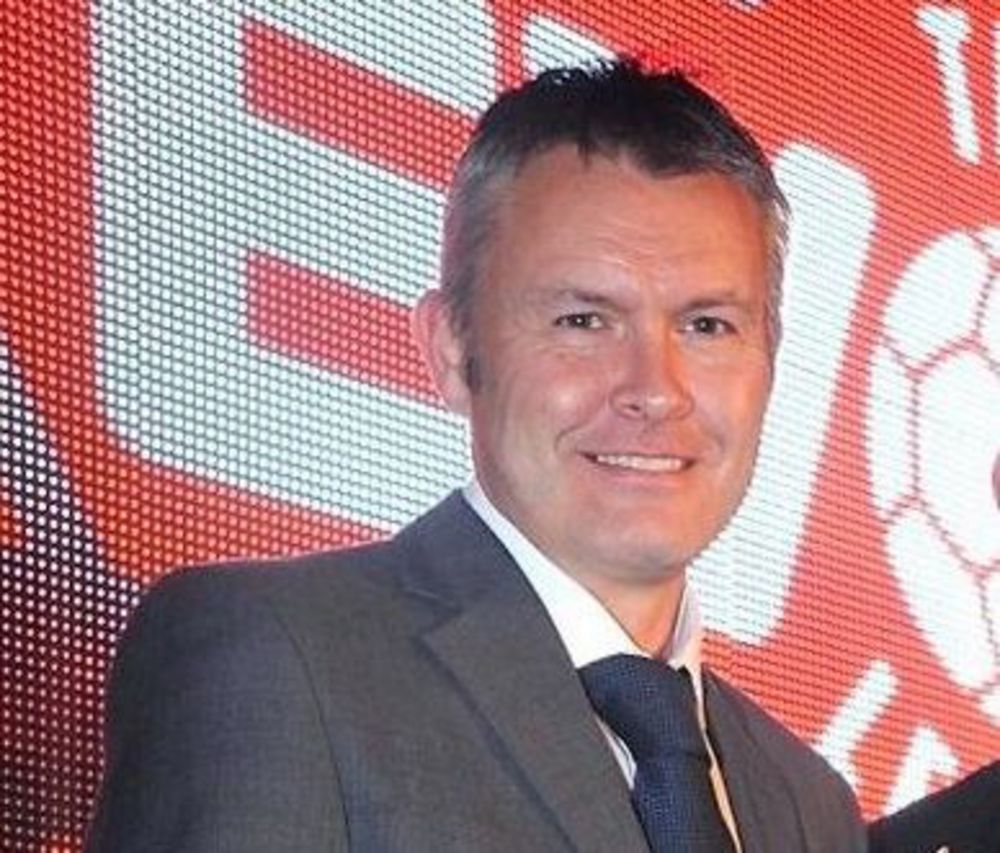
Richard Evans
At the tender age of 28, Richard Evans took the player-manager's role having played in every season since Romulus began, doing that alongside a successful Saturday career in the Conference South with Moor Green (now Solihull Moors) and Stourbridge.
For the next two years, Romulus continued to succeed at the top of local Sunday football, before the decision was taken to progress into the Saturday game.
Twenty years after they were formed, the club joined the FA's Saturday non-League Pyramid system. And what a success this proved to be!
Promotions followed as Roms climbed their way up through the Pyramid, further than any other Sunday team has ever emulated.
Season 2003/04 was a record-breaking campaign for the club, and an enthralling battle for the league title with Leamington ended with the Roms gaining promotion to the Midland Alliance as champions.
This was just one triumph that season, with the Roms completing a unique treble - they also lifted the Birmingham Midweek Floodlit Challenge Cup with a 2-1 triumph over Nuneaton Griff, and they won the Midland Combination Endsleigh Challenge Cup, beating Coventry Marconi 2-0.
The following season, Roms finished a creditable twelfth in their Midland Alliance debut season, with more cup success following, as they defeated arch-rivals Leamington 1-0 in the Terry Allden Memorial Cup final.
Champagne corks were popping once again in 2005/06, winning promotion to the Southern League, secured as runners-up behind runaway champions Leamington.
This success was compounded by an impressive FA Cup run, coming within seconds of beating Worcester City, then of the Conference North, at St George`s Lane - but a late equaliser and subsequent defeat in the replay ended the Roms dream.
In 2003/04 they won the Midland Combination and were promoted to the Midland Alliance.
In 2006/07 they finished second and were promoted to the Southern League Division One Midlands.
They finished a very creditable tenth and then eleventh under Richard Evans and Keith Brown and the Roms had another ground-breaking season the following year, securing an excellent eighth position in the league, and reaching two County Cup semi-finals - beating Burton Albion 2-1 in the Birmingham Senior quarter-final was a notable achievement.
In the summer of 2010, with Richard Evans still in charge of team affairs, Romulus were moved sideways in the non-League Pyramid, to the Northern Premier League Division One South.
The team finished the season in tenth place on 67 points – their highest ever points tally in a Step 4 league - finished a respectable twelfth at the end of 2014/15, tenth in 2015/16, and 13th in 2016/17 before finishing bottom at the end of the 2017/18 season when they were relegated and back into the Midland League Premier Division.
The long-serving Richard Evans is now the club`s owner and Jason Lanns hold the managerial hot-seat.
At the start of the 2018/19 season the club returned to their original base at Castle Vale Stadium in the Castle Vale area of Birmingham.
The stadium boasts a 3G pitch and an air-conditioned clubhouse.
Ruislip joined the Premier Division of the Middlesex League in 1981, replacing Ruislip Town who had left in 1980 after finishing bottom of the league for two consecutive seasons.
They finished second-from-bottom of the Premier Division in their first season and ended the 1983/84 season in last place.
The league then became the Middlesex County League and despite only finishing eleventh in the league`s inaugural season, Ruislip moved up to the Southern Division of the Southern League.
Colin Barnes was the first man to take charge of a Southern League game for Ruislip at Breakspear Road – now called the Middlesex Stadium and home to former Southern League and current Spartan South Midlands League outfit, Hillingdon Borough.
Barnes started his playing career with Leyton Orient but was released without managing to break into the first team at Brisbane Road.
He went on to have spells with Wembley, Ruislip Manor, Southall and Uxbridge until he was 25.
Sadly, he suffered an injury which meant he had to stop playing and he immediately took up coaching.
He took over as manager of Ruislip in 1985 and his first season in charge at the higher level saw them finish a very creditable eighth.
He left for Burnham after that and was replaced by Brian Caterer, but the league proved a bit too much for Ruislip and two seasons followed finishing second and third-from-bottom.
Ruislip finishing in last place in the 1988/89 campaign, after which they left the league, and subsequently folded.

Most clubs are looking for volunteers. Find out more on the button below:
www.PitchingInVolunteers.co.ukAll the news and results in one place.
REGISTER